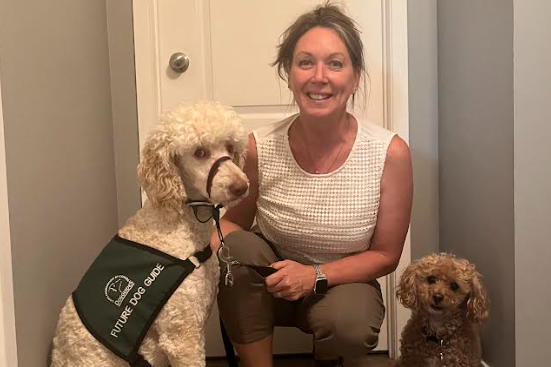Owning a dog is part of life for many people, but for aging seniors it can get complicated.
That’s where ElderDog Canada comes in. The non-profit organization, with locations from coast to coast, helps seniors keep their dogs, knowing they’ll be cared for even if they can’t walk them, or get to vet appointments, or even pick up supplies.
Halton’s ElderDog group – called a pawd – is run by Terri Hall, and has about 30 volunteers.
Hall said ElderDog Canada represents a coming together of two things: a recognition of the vital connection between older adults and their dogs and the importance of preserving the lives and dignity of older canines.
By providing support for older adults who live at home with challenges affecting dog care, they can continue to benefit from their canine companions. ElderDog can help with things such as:
- Assisting seniors with exercising their dogs
- Delivering or picking up dog food from a grocery or pet store
- Providing light tasks associated with animal hygiene
- Grooming such as nail clipping or help with brushing
- Transportation to and from vet or groomer
- Temporary care during hospitalization
ElderDog volunteers visit seniors at home and help with basic dog care activities. They wear approved photo IDs and have completed criminal record checks. There are no fees for any of the ElderDog services.
ElderDog became registered in 2011, and began in Nova Scotia where the founder’s efforts skyrocketed and it became extremely popular. It spread to New Brunswick and then skipped to the west coast in Vancouver and Edmonton. There are some 4,000 volunteers across the country, but only 100 in Ontario’s nine pawds and about 30 in Halton’s Pawd.
“Keep in mind each one of these are 100 per cent volunteer-driven,” Hall said. “A lot of the pawd leaders work full time; it's hard to manage when you have a family and everything else.”
“When a volunteer wants to, they can choose to be a dog care support person, maybe picking up food, if they want, at the grocery store, performing light hygiene tasks, or maybe offering transportation to take the dog to a vet or groomer,” said Hall. “That’s dog care support.”
Volunteers must apply, listing the hours they are available and they must complete a police vulnerable screening check.
After a photo badge has been issued they can get to work and Hall said that nine times out of 10, it’s walking the dogs.
“We are at the mercy of their availability, so we have an online sign up and people sign up for whatever nights they’re available,” said Hall, who also fosters for Guide Dogs of Canada and has a dog that will graduate fro the program later this summer. Her own pet is a St. John Ambulance dog that has been visiting senior residences whenever possible over the last nine years.
During the pandemic, when Hall wasn’t able to visit with her therapy dog, she looked into doing something else and found ElderDog.
Some volunteers do dog walking and also sign up to be a foster; the latter requires a home visit to be sure everyone in the household is on board.
Hall said ElderDogs Halton has recently welcomed Kirstin Bull from Burlington as its new volunteer coordinator.
“I’m so thankful she reached out because you need executive members too,” she said, adding she also signed up her teenage daughter since she can use the hours she accumulates at ElderDog for her high school credit. “Many parents have signed up and get their children involved too.
“ElderDog will allow a parent to sign up for walking dogs, but a high school student can volunteer with them to get their volunteer hours,” she said. “I have two parents doing it for their kids; they signed up as volunteers, and then their kids go out with them.”
Another of the key programs ElderDog provides is rehoming of older dogs.
For older dogs who have lost a human companion due to a residence change, or who are left without a caregiver due to illness or death, ElderDog can provide loving homes for the dogs to live out their lives they way they deserve; every attempt is made to rehome the dog with an older person.
Eligible dogs are ones who are 10 years of older (can vary depending on breed/size), have worked in a service capacity and have no history of aggression, or they’ve had a disruption in their lives due to change in residence or human death or illness.
Hall said being a volunteer with ElderDog is rewarding and encourages anyone considering to learn more about the various programs available.
Go to https://elderdog.ca/ to learn more.



